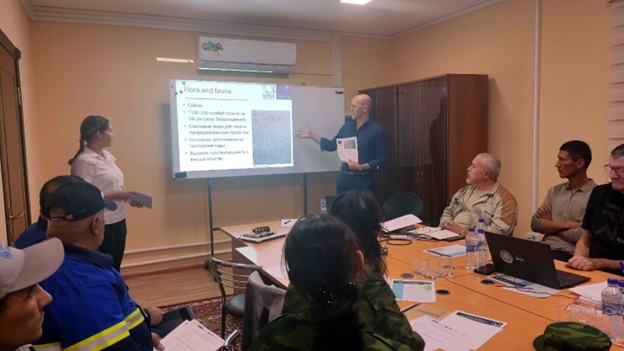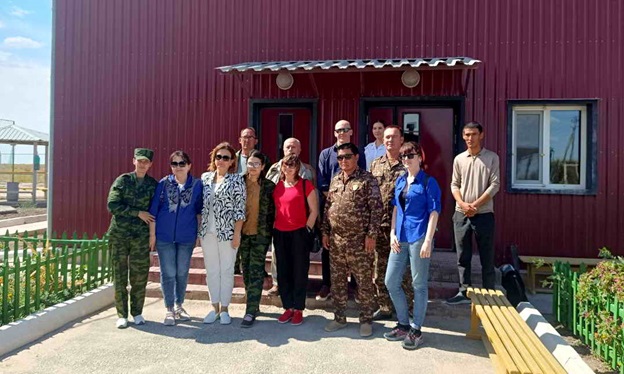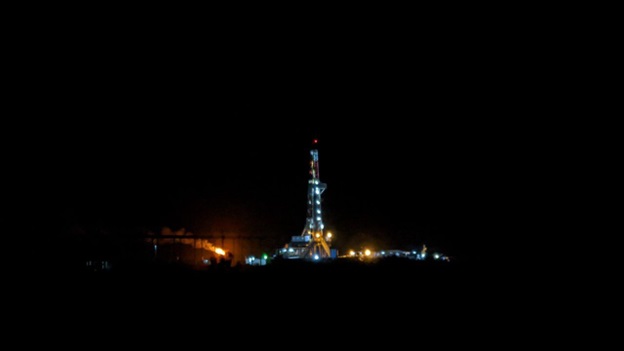On September 14, in the Muynak region of the Republic of Karakalpakstan, at the Surgil gas processing facility, a training was held on “Biodiversity and natural gas production in the Aralkums” using best practices for oil and gas industry employees with the participation of international expert prof. J.W. Bull from Oxford University, UK. The training was attended by employees of the Aralkum National Natural Park, inspectors of the Department of Ecology and Environmental Protection of the Muynak region of Karakalpakistan, employees of the Uz-Kor Gas Chemical, ERIELL Group, JV Kungrad Soda Plant LLC, as well as representatives of SCA and the Institute of Zoology of the Academy of Sciences RUz.
This training focused on mitigating the impact of industry on biodiversity and developing biodiversity conservation plans. The training was organized as part of the project “Resurrection Island: Nature Conservation and Development of the Aral Sea Region”, which is supported by the British Darwin Initiative Foundation. The project is being implemented by the Institute of Zoology of the Academy of Sciences of the Republic of Uzbekistan together with the University of Oxford (UK), the Saiga Conservation Alliance, the Ministry of Ecology, Environmental Protection and Climate Change, the Research Institute for Tourism Development and JV Uz-Kor Gas Chemical LLC. This initiative promotes the creation of a protected area on the former bottom of the Aral Sea in order to preserve the unique biodiversity of this region and develop sustainable sources of income for the local people, including through the development of sustainable forms of tourism (ecological tourism), and also ensures mitigation of the impact on biodiversity through the use of the principle of “zero losses for nature”.
In recent years, much attention has been paid to studying the impact of industrial activity on the environment, preventing degradation and reckless use of the ecological system. At the same time, it is necessary to consider the impact exerted by gas production, where, along with the economic and social aspects, an assessment of the possible environmental consequences of the use of gas production technologies is also important. In particular, the exploitation of gas fields such as “Uchsai”, “Surgil” and the “Western Aral”, which is just being put into operation, located in close proximity to the territory of the national park, has a certain impact on nature at all stages, from geological exploration to pumping gas through the gas pipeline, gas separation and production of polyethylene and polypropylene. Therefore, it is very important to develop a dialogue between the industrial sector and representatives of environmental protection.
During the training, the following thematic blocks were considered: information about the fauna and flora of Aralkum, description of functional areas of “Aralkum” National Park, current and future activities for natural gas production in Aralkum, the possible impact of this activity on the wildlife of Aralkum, the necessary requirements for minimizing this impact, the creation and implementation of an Action Plans for the Conservation of Biodiversity.
The training participants also performed a series of practical exercises to assess the impact on desert ecosystems and their key representatives – saiga, flamingos, various aspects of company activities, describe existing measures and develop the necessary measures to reduce the negative impact on contract areas that contribute to the achievement of biodiversity conservation goals. The interactive mode of the event and active discussions allowed participants to share their experiences, discuss problems, and identify barriers to biodiversity conservation.
It was especially valuable that the training took place on the territory of the Surgil Integrated Gas Treatment Plant (CGTU), whose management provided the project with practical assistance in carrying out the event. The project team also became familiar with the process of natural gas production and its separation on the territory of the gas processing facility.




Working moments of the training. Photo by O. Esipov, Uzkorgaz
